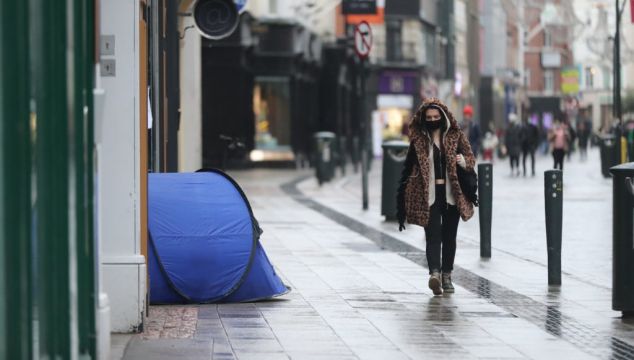The director of the Dublin Region Homeless Executive (DRHE), Mary Hayes has said they have the capacity and are planning to accommodate anybody who becomes homeless as a result of the end of the eviction ban.
Ms Hayes told RTÉ Radio’s News at One that they were always on a planning footing and had already received a number of enquiries from people in the Dublin area.
She said she would encourage everyone to contact their local authority at the earliest opportunity.
People had used the time of the eviction ban to negotiate with their landlords, she said.
The DRHE was in contact with 270 landlords in relation to the tenant in-situ scheme, 33 had been sold and 77 were under negotiation.
Not all of the people who had contacted them were in receipt of a notice of termination, but the DRHE was glad that people were contacting them early.
“The key thing for people to do, especially if they have received a notice of termination already, is contact your local authority at the earliest possible opportunity. It gives us a chance then to work through what the options are available to each household and to try, above all, to prevent homelessness.”
The numbers contacting the DRHE requiring emergency accommodation was not high at present, she said. “We are constantly working away at that number in terms of trying to find alternatives for people other than homelessness.
“We do expect an increase (in people contacting the DRHE), we would expect and welcome an increase of inquiries and people contacting us and finding out what's available to them.
"It is normal, and we would encourage people to contact their local authority at the earliest possible time. We are saying that there will be more notices of termination, but at least we get the opportunity then to talk through with people. So people are confident they have accurate advice and information in terms of what their options are.”
Pinch points
The DRHE had worked through “many pinch points” in the past, she said – through Covid, through extreme weather situations.
“We are always on a planning footing . It is our role and our job to make sure that there is a safe supply of emergency accommodation available to people, recognising that what people really want is a home. But we need to ensure that as an absolute last resort that we will have emergency accommodation available to those who need it.”
The DRHE has capacity planned, she said. “We have it in place already for the coming months. We've added approximately 400 bed spaces to our overall capacity.
"But again, what I would say is that the number changes daily, we go up and down adjusting demand on a daily basis. We run a procurement process throughout the year looking for emergency accommodation. So we're always on a footing where we can draw an additional number.”
“We are there to ensure that if all else fails, emergency accommodation is available. Nobody wants to come into emergency accommodation, and we want to explore, and we want to assist people to explore every possible alternative to that.”

Ms Hayes acknowledged that it was difficult to source affordable accommodation in the Dublin region. The DRHE’s Homeless Hub scheme had assisted 270 so far this year and just under 1,000 last year. “It is difficult, but we will give people every support to find that.”
The Dublin Region Homeless executive has never advised someone to go to a Garda station, she responded about such advice being given to people.
“The only circumstances in which we have ever sent them into a Garda station is if someone presents late at night, and we need to verify their identity. That would be the only circumstance. And after that we would place them. But we are not considering that as an option.”
While it was competitive trying to secure emergency accommodation, the DRHE had been providing that service for some time and had built relationships.







